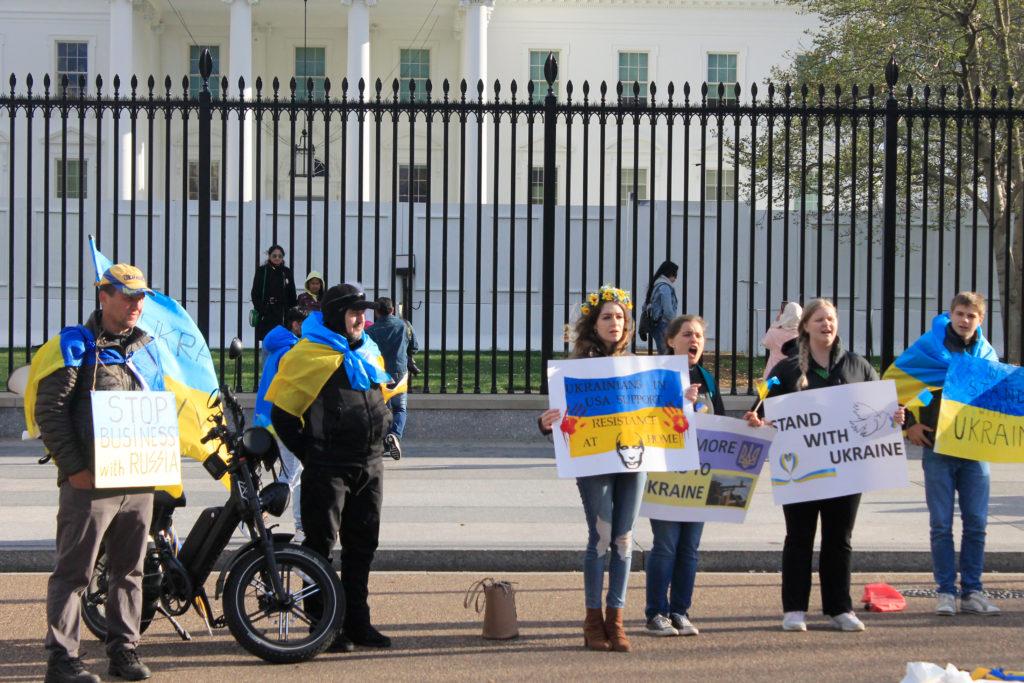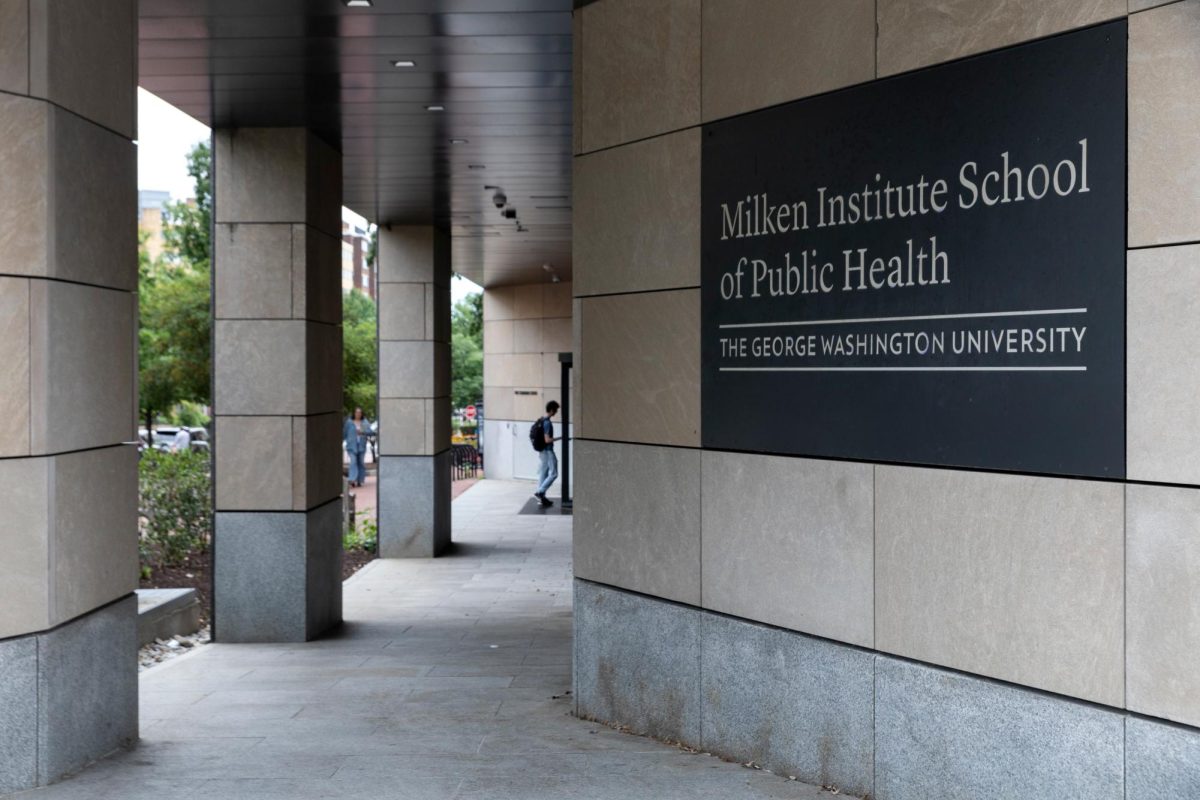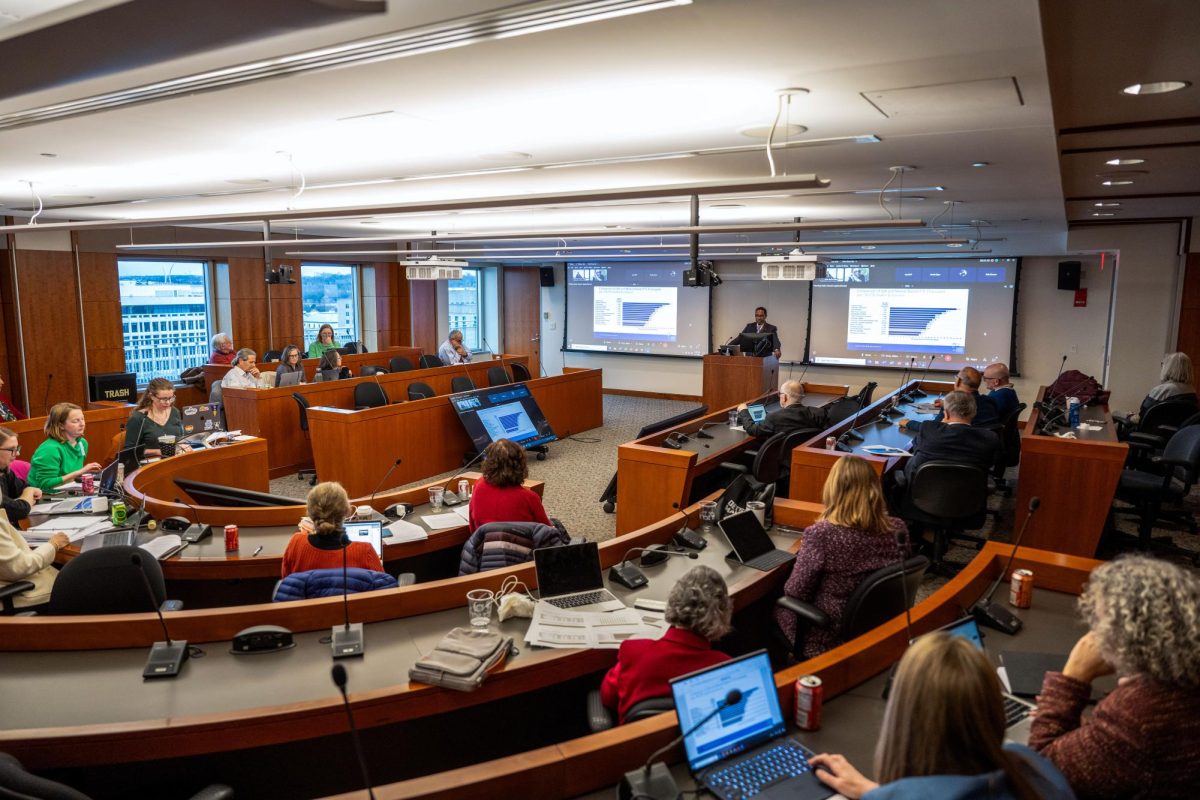Communication has persisted between Kateryna Pyatybratova, a staff member in GW’s public leadership center, and her friends and family still living in Ukraine despite the ongoing war with Russia earlier this month.
Speaking before a congregation of interfaith leaders at a “Pray for Ukraine” service at a D.C. church earlier this month, Pyatybratova recalled hearing back from a friend hiding from invading Russian force. Her friend said they were sitting in a cellar with their children, listening to the sounds of constant shooting and watching scenes of burning cars as troops attempted to surround their home of Kharkiv in northeast Ukraine.
Pyatybratova – the director of marketing and business development in the Center for Excellence in Public Leadership – said she was born in Lviv, a city in western Ukraine, and spent her childhood in Kharkiv before immigrating to the United States when she was 12. She is now leading efforts to advocate for Ukrainians, helping raise more than $5,000 for disaster relief in the country and organizing online forums to connect Ukrainians and refugees with resources like food and shelter.
“Thank you for not forgetting us, we are sitting in a basement, the food and water are ending, the shootings don’t stop,” Pyatybravota read from her friend’s message at the event. “They want to surround Kharkiv. Around our house there were burning cars. We couldn’t get out. We are trying to see if we can send children to the Romanian border and stay here. Maybe the children will be spared. With a big risk, I ran back to the house to prepare hot tea for my daughter and recharge my phone, since the cellar doesn’t have an outlet. Please pray for us.”’
Students and staff like Pyatybratova are raising donations and spreading awareness to rally support for Ukrainian residents and refugees during the war through social media campaigns, nonprofits and online articles sharing stories from the country. GW community members have said their global connection to the conflict has amplified their responsibility to advocate for those affected by the crisis.
Russia launched a full-scale invasion of Ukraine late last month, killing more than 2,000 civilians, displacing millions of Ukrainians and destroying their homes and towns. Ukrainians were forced to flee to neighboring countries like Poland and overseas havens like the United States, which recently opened space for 100,000 refugees.
Of the more than $5,000 she has raised for disaster relief, Pyatybratova will send $1,000 to a family center in Zhytomyr, a city in the western Ukraine, where her cousin works. She said her cousin wrote her asking for “badly need resources” to help staff process some of the more than 100 families that they’ve sheltered within a “few days.”
She raised the funds through her nonprofit organization called “Gifts of Love for Ukraine,” which funds faith-based groups either based in Ukraine or aiming to support the country to help them send “micro-grants, goods and services” to families.
“Given the uncertainty of public service delivery and capacity of humanitarian organizations, faith-based institutions offer the only truly reliable alternative to getting help on the ground quickly, efficiently and with a high degree of accountability,” she said in an email.
Pyatybratova said she also directed her cousin to a faith-based nonprofit called “Friends of Ukraine,” which is distributes donations with a focus on Gospel ministry in the country.
Pyatybratova runs a Facebook group called “Let’s Welcome Refugees,” which includes about 6,000 members who exchange information about organizations accepting donations and opportunities to help refugees from Ukraine, Afghanistan, Syria and other “war-torn countries.” Members of the group offer free language lessons for refugees and links to donate to organizations like World Central Kitchen, a nonprofit organization that provides meals during disasters.
Ukrainian refugees have also posted in the group in hopes of connecting with people who can offer housing in nearby countries like Poland.
“Hello, I’m looking for a small apartment near Warsaw, Poland for two refugees from Ukraine for a long term stay,” one post reads. “We can pay affordable price. Please, any help or information.”
The post received a response from a group member linking a charity in Poland that aids refugees and could help them find housing opportunities.
Leslie Grossman – the faculty director of the Executive Women’s Leadership Program, a conference for women leaders in public and private sectors – said she has been working with Pyatybratova to write articles about Ukraine to be posted on her website called Her Circle Leadership – which offers women’s leadership mentorship. She said the articles tell stories of her loved ones in Kharkiv and Lviv and her own fundraising efforts
“So much of what I hear is also coming through her and it’s really heartfelt leadership,” Grossman said of Pyatybratova. “How do we, as leaders over here, help and support what’s going on in Ukraine and fill their needs [and] as leaders in this country have an impact that will support the stance that they’re taking for freedom. How do we do that here? And that’s the kind of thing that I think we all need to be looking at.”
She said alumni in the program are discussing how women can learn from the leadership tactics of President Volodymyr Zelensky and the courage of Ukrainians as part of a half-year-long monthly discussion group called “Mastermind,” which is held after the conference.
“How do we apply that learning of what we’re seeing to our own lives,” she said. “Not just to support Ukraine, of course, we are supporting Ukraine, but how do we look at it and say, ‘Well, how do I become that courageous leader? How do I become a better communicator, just like we see is in Zelensky.”
Senior PJ Johnson, the president of College Democrats, said the organization is continuously researching and vetting different humanitarian groups like Voices of Children – an organization that provides psychological support to refugee families. College Democrats also posted more than half a dozen links on their Instagram story to different advocacy groups, like UNICEF and Amnesty International, which provide support for refugees and those still in Ukraine during the crisis for organizations.
Johnson said members of College Democrats are speaking with Ukrainian students to hear how they can best support them throughout the crisis.
“That’s what we’re here to do,” he said. “We’re here to listen and to advocate in the way that they feel will help them.”








